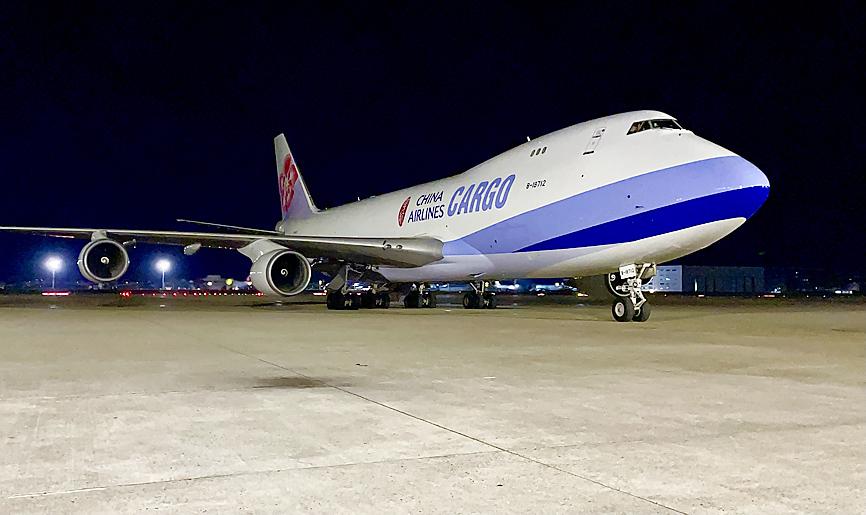China Airlines Ltd (CAL, 中華航空) and EVA Airways Corp (長榮航空) yesterday said that they would increase passenger flights at the end of this month or early next month thanks to rising demand and relaxed border controls.
CAL in a statement said that it first plans to increase weekly flights between Taiwan and China, raising the number of flights from Taipei International Airport (Songshan airport) to Shanghai Pudong International Airport from five to six and flights from Taiwan Taoyuan International Airport to Pudong airport from two to five.
Next month, the number of weekly flights from Taiwan to Singapore is to increase from one to two, CAL said, adding that it plans to offer one flight per week from Taiwan to Penang, Malaysia.

Photo: Chu Pei-hsiung, Taipei Times
For the Japanese market, CAL said that it would continue flying from Taoyuan airport to Narita International Airport and add two flights per week from Songshan airport to Tokyo International Airport starting in May.
The airline would also offer more flights to the North American and European markets from next month, it said, adding that flights to Vienna would resume next month, while a weekly flight to Vancouver, Canada, would begin in May and flights to New York City would resume in June.
CAL said that it also expects to offer weekly flights to Sydney, Melbourne and Brisbane, Australia, and a monthly flight to Auckland, New Zealand.
Overall, passenger capacity would increase in the second quarter, up 20 to 30 percent from the first quarter, CAL said.
EVA Air said that it plans to resume direct flights to Vienna, starting with a monthly flight, from next month, as well as a weekly flight to London.
Starting in May, EVA Air said it would increase flights between Taiwan and North America from 12 to 13 per week, while adding flights to Bangkok and Phnom Penh.
However, demand is not expected to soar immediately, even though some countries have relaxed their border controls, the airlines said.

Nvidia Corp CEO Jensen Huang (黃仁勳) is expected to miss the inauguration of US president-elect Donald Trump on Monday, bucking a trend among high-profile US technology leaders. Huang is visiting East Asia this week, as he typically does around the time of the Lunar New Year, a person familiar with the situation said. He has never previously attended a US presidential inauguration, said the person, who asked not to be identified, because the plans have not been announced. That makes Nvidia an exception among the most valuable technology companies, most of which are sending cofounders or CEOs to the event. That includes

TARIFF TRADE-OFF: Machinery exports to China dropped after Beijing ended its tariff reductions in June, while potential new tariffs fueled ‘front-loaded’ orders to the US The nation’s machinery exports to the US amounted to US$7.19 billion last year, surpassing the US$6.86 billion to China to become the largest export destination for the local machinery industry, the Taiwan Association of Machinery Industry (TAMI, 台灣機械公會) said in a report on Jan. 10. It came as some manufacturers brought forward or “front-loaded” US-bound shipments as required by customers ahead of potential tariffs imposed by the new US administration, the association said. During his campaign, US president-elect Donald Trump threatened tariffs of as high as 60 percent on Chinese goods and 10 percent to 20 percent on imports from other countries.

Taiwanese manufacturers have a chance to play a key role in the humanoid robot supply chain, Tongtai Machine and Tool Co (東台精機) chairman Yen Jui-hsiung (嚴瑞雄) said yesterday. That is because Taiwanese companies are capable of making key parts needed for humanoid robots to move, such as harmonic drives and planetary gearboxes, Yen said. This ability to produce these key elements could help Taiwanese manufacturers “become part of the US supply chain,” he added. Yen made the remarks a day after Nvidia Corp cofounder and chief executive officer Jensen Huang (黃仁勳) said his company and Taiwan Semiconductor Manufacturing Co (TSMC, 台積電) are jointly

MARKET SHIFTS: Exports to the US soared more than 120 percent to almost one quarter, while ASEAN has steadily increased to 18.5 percent on rising tech sales The proportion of Taiwan’s exports directed to China, including Hong Kong, declined by more than 12 percentage points last year compared with its peak in 2020, the Ministry of Finance said on Thursday last week. The decrease reflects the ongoing restructuring of global supply chains, driven by escalating trade tensions between Beijing and Washington. Data compiled by the ministry showed China and Hong Kong accounted for 31.7 percent of Taiwan’s total outbound sales last year, a drop of 12.2 percentage points from a high of 43.9 percent in 2020. In addition to increasing trade conflicts between China and the US, the ministry said